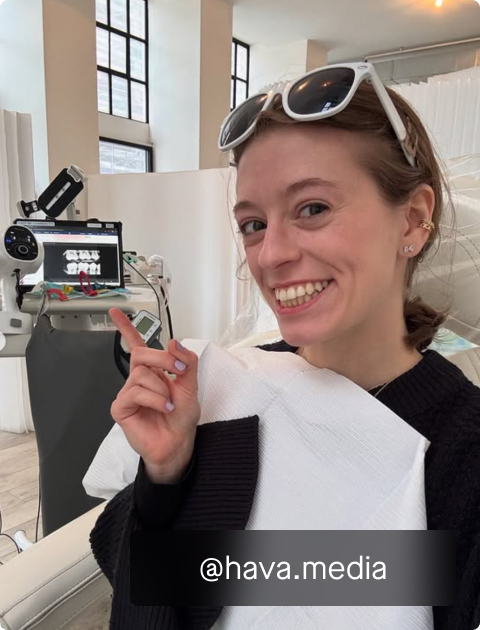Braces and receding gums

There's nothing quite like getting your braces off. It's an exciting reveal to see how your smile transformed during the months (or years) you've spent with braces. Your orthodontist and dentist stressed the importance of oral hygiene during braces. But don't let up on your oral hygiene after the braces come off!
Some 4 million people are wearing braces in the US, and 1 million of them are adults. Braces are not only a great way to straighten your smile, but it's important to address crooked teeth that put extra pressure on your mouth and cause future complications.
What do braces do to your gums?
Remember when you first got your braces? It felt like somebody parked a car in your mouth from all the new metal. That metal is designed to align your teeth. And that metal will also attract and help bacteria accumulate, affecting your gum health. The bacteria buildup around the metal will quickly turn into plaque and tartar, which allows disease-causing bacteria to get trapped near or below your gum line. This bacteria can cause gingivitis and gum disease which is linked to other health conditions including diabetes and heart disease.
Gums can recede from teeth moving, which is why your orthodontist does a full exam to determine if alignment is right for you. "Braces put extra stress on the bone as the teeth shift. And that pressure can extend to the gums," shares Sarah Clark, RDH. "Certain mouths may not be structured for that type of pressure, which can result in issues with the surrounding bone and gum tissue. That's why orthodontists do a thorough review of your situation before placing you into any type of teeth alignment.
And studies have shown that braces can cause gum recession due to the increased visible plaque and inflammation increases before and after treatment. Translation: dirty teeth during braces increase your chances of gum recession.
While receding gums is important to avoid, you'll also want to watch out for swollen gums during braces or clear aligners.
Swollen gums after braces are placed or tightened
If you recently got braces or they were tightened, your gums might feel a bit tender. There are a few things that might be causing that tenderness:
- Reaction to shifting teeth. When braces are first set or are tightened, it's common to experience pain and swelling as the teeth continue their journey.
- Gingivitis from poor oral hygiene. If your gums stay tender, or begin to get tender after your braces have been tightened, that might be a sign of early gingivitis. Bacteria builds up around your braces and when it reaches your gums, it will irritate and cause inflammation.
- Gingival hyperplasia. Sometimes the plaque buildup from braces can trigger gingival hyperplasia where there is an overgrowth of gum tissue around the teeth.
For most cases of gum swelling with braces, the way to address it is to step up and maintain great oral hygiene habits from home.
Cleaning your gums with braces, and after the braces come off
Keeping your gums clean before, during, and after braces and clear aligners helps you keep that beautiful smile you worked so hard to get. "Having a clean mouth is the best way to have a smile that you're proud of," explains Iman Zayed, RDH. "When my patients begin braces I tell them that this is an investment in their smile, and that keeping their mouth healthy helps them reap the benefit of all the time and money they are spending on braces."
Here are our clinicians' top recommendations for keeping your gums clean during and after braces:
- If you use a manual toothbrush, consider upgrading to an electric sonic toothbrush. That means the bristles pulse in a way that's effective for cleaning and safe for your gums.
- Use a soft-headed bristle
- Brush at least twice per day for two minutes to ensure you're scrubbing all the nooks and crannies around the gum line.
- Floss or use a water pik daily to keep the spaces between your teeth clean.
- When your braces come off, wear your retainer and keep it clean. When you take it out in the mornings, brush it under warm water with antibacterial hand soap. Seriously. The antibacterial ingredients in the soap kill the bacteria that's been hanging out on your retainer all night, and the brush helps the soap reach all the grooves.
Gum recession is one of the top concerns with our members and we really enjoy helping them address it from home. If gum health is a priority for you, try out our at-home starter kit and connect 1:1 with your virtual hygienist to discuss the right at-home techniques to stop gum recession from getting worse.
Want to learn more about gum recession? Check out "Gum Recession: Your ultimate guide" for everything you need to know, from how to keep gum recession from getting worse, the right products or procedures for gum recession, and what braces do to your gums.









